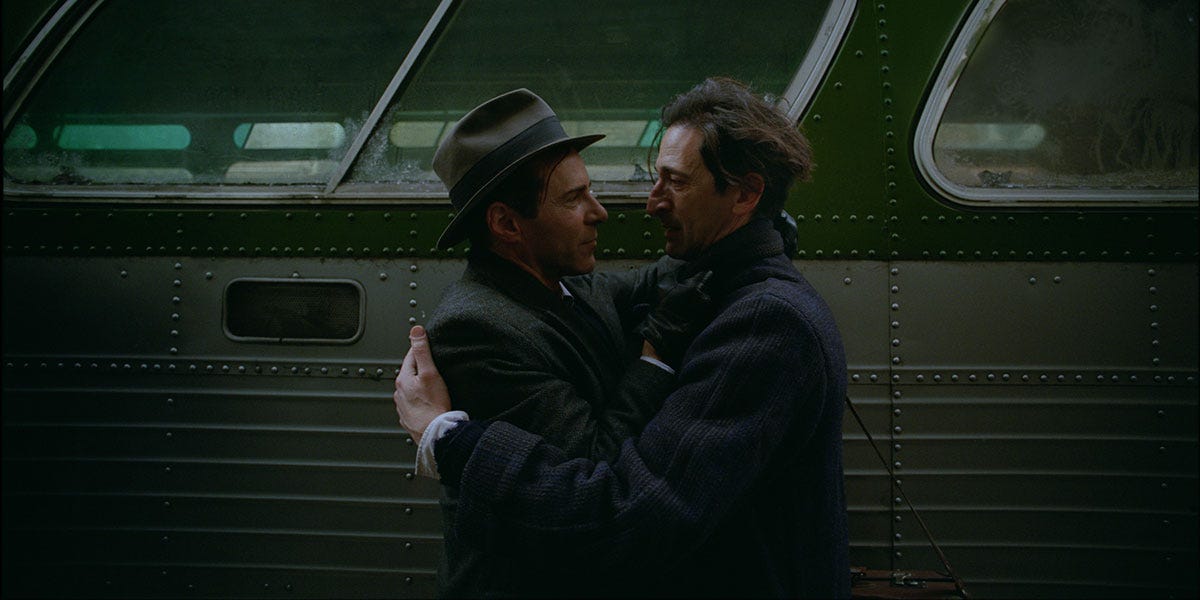TIFF'24: The Brutalist
Brutal in design, brutal in life
My coverage of TIFF’24 continues with a film that I hadn’t heard a lot about until shortly after the beginning of this year’s Venice Film Festival, which runs nearly concurrently with TIFF. Many critics threw a lot of praise in the way of Brady Corbet’s (the director of Vox Lux) newest film, a three-and-a-half hour epic about a Holocaust survivor’s attempt to rebuild his life in America. Some even talked about it like it was a new classic, up there with films like Citizen Kane or the Godfather. I don’t know if I’m at a point where I can comfortably say that about this film, but it is really damn good despite (or perhaps because of) its immense despair.
The Brutalist stars Adrien Brody (from the Pianist) as a Hungarian Jew who arrives in New York City in 1947, with his wife (played by Felicity Jones from On the Basis of Sex) stuck in Europe. Brody’s character experiences homelessness, drug addiction and complete misery until he meets a wealthy man (played by Guy Pearce from Prometheus). Before the Holocaust, Brody’s character was an accomplished Brutalist architect and Pearce’s character wants to become his benefactor and finance the construction of a massive community center to be designed by our protagonist.
Divided into two halves in a manner similar to Kubrick’s Barry Lyndon, this lengthy drama depicts a rise to a successful life and happy moments as well as a slow descent down. The film opens with an electrifying overture, in which we see a long take of Brody leaving the ship that brought him to America and looking up into the sky. The camera tilts up and we see the Statue of Liberty, but completely upside down. A good metaphor for what is to come, the American Dream is not easily achievable and for many it is a nightmare.
Despite a brisk pacing that makes the film move quickly, it takes time with all of its shots. It’s a gorgeous film, shot in VistaVision which is a process that involves shooting 35mm film sideways and blowing it up to 70mm. I saw this film sitting in the front row of the cinema and every shot seems as if it’s slightly degraded. It feels like we’re watching a historical document, peeking into the hard life of a Holocaust survivor and attempted American capitalism survivor. Brody’s face occupies much of the film’s runtime, a mix of weary wrinkles and hopeful twinkles in his eyes. But with a name like this, it’s fairly obvious to expect an immense amount of hardship and brutality.
It makes for a compelling drama, especially once Jones’ character arrives in America and what seems to be a happy reunion turns much more complicated. Her performance I found to be the most engrossing, although Brody is sure to dominate awards competition with his intense performance. It does call to mind his Academy Award-winning performance in the Pianist, another film about immense hardship and brutality. Jones plays a woman who remains incredibly hopeful but always pragmatic. It breathes fresh air into a film that seems to thrive in pain.
Only time will tell if this film will become a classic, and no amount of critics saying that now will make it one. It is audiences, generation over generation, who in discovering this and re-watching it could make it a classic. But before that can happen, this film needs to be watched on the biggest screen you can possibly see it on. And while a 3.5 hour film might be a slog for some, it can be a life-changing experience. You just need to be willing to submit to the brutality.



